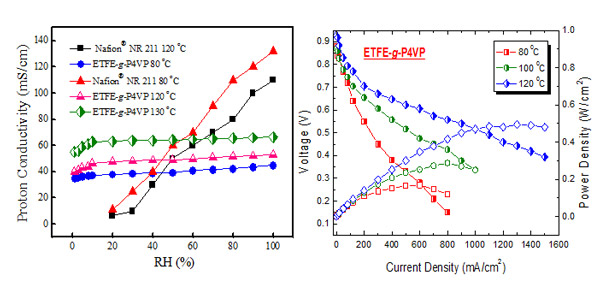Fuel cells are one of the most promising electro-chemical power sources both for mobile and stationary applications. Among others, the polymer electrolyte membrane (PEM) fuel cell has received great attention due to their high power density, quick start-up time, pollution free operation and compact structure. The main challenges for this technology are poor reaction kinetics at the cathode, low tolerance of Pt catalyst to carbon monoxide poisoning, and complexity of integration of hydrogen reformer technology.
Most of those shortcomings arise when the operation temperature is limited to below 100 °C (typically 60-80 °C), at atmospheric pressure which is in turn limited by the current state-of-the-art membranes such as Nafion® because of its water assisted conduction mechanism. Nafion® membranes have advantages such as high mechanical and chemical stability at temperatures below 100 °C and high proton conductivity in hydrated form as well. However, the water requirement in the membrane limits the operation temperature to below 100 °C in theory. Thus, the synthesis and characterization of proton conducting membranes constitutes a significant step for the development of high temperature PEM fuel cells.
This study’s main focus is the preparation of phosphoric acid doped proton exchange mem-branes to operate at high temperature (especially above boiling point of water) and water free conditions for PEM fuel cells. Owing to a simple manufacturing process, radiation-induced grafting, the procedure that is offered to fabricate high temperature membranes is able to overcome casting (or manufacturing) problems of other high temperature membrane candidates. Nitrogen containing monomers are selected since strong interaction with phosphoric acid to create N-H interaction to operate at high temperature is expected.
The resultant membranes exhibit promising thermal and mechanical properties, lower water uptake and encouraging proton conductivity. Moreover, both the ex situ proton conductivity measurements and fuel cell testing prove that these membranes are very promising to operate at high temperature and dry PEMFC operation conditions.
The work is supported by the Project Grants:
- The Synthesis of Low Cost Alternative Proton-Exchange Membranes for Fuel Cells and the Utilization of Conducting Polymers as the Catalyst Support, 2008-2011, supported by TUBITAK 1001 Program (PI: S. Alkan Gürsel)
- Polymer Electrolyte Membrane Fuel Cell with the Dead-End Anode and Large Active Area, 2014-2017, supported by TUBITAK 1003 Pro-gram (Researchers: S. Alkan Gürsel, Y. Karataş; PI: S. Yeşilyurt)
